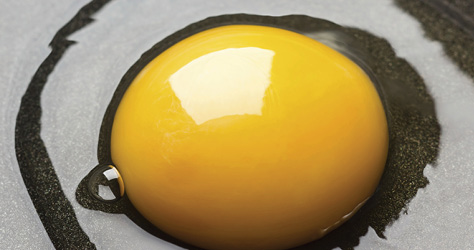It's only for nine months!
Just when you think you can ease back a bit on the calorie counting, latest fad diets and pudding refusals, there comes a whole new list of food rules for pregnancy.
At a glance
- Raw shellfish should be avoided because of the risk of food-poisoning
- Pâté may contain listeria and must be avoided
- Eggs with solid yolks and whites are fine to enjoy

Obviously the main mantra for eating during pregnancy is healthy and wholesome – but there are some food stuffs that could pose a health risk and should be avoided while you've got baby on board (but just imagine how great they'll taste when you can have them again nine months down the line!).
Cheese
Soft cheeses can carry a bacteria which could cause listeria, so avoid mould-ripened cheese like Camembert and Brie any others with a rind - likes goats' cheese and sheeps' cheese, including those made from goats' milk. Soft blue-veined cheeses like Roquefort, Gorgonzola and Danish blue should also be off the menu while you're expecting
Eggs
Eggs are nutritious and protein rich and can be used for some fabulous dishes. The Food Standards Agency has confirmed that pregnant women can return to eating runny or lightly-cooked eggs – as long as they have the British Lion stamp on. The new advice, (since October 2017), replaces the previous warning that vulnerable groups should eat eggs only when fully cooked. Eggs produced under The British Lion Code of Practice come from hens that have been vaccinated against salmonella. Just remember to store them properly and consume them within the best before date.
Milk
The milk you drink needs to be pasteurised, so avoid 'raw' unpasteurised milk (cows', goats' or sheep's) in your cuppa, or any products made from it (so don't cook with it). This is because there is an increased risk of toxoplasmosis, listeriosis and campylobacter in unpasteurised milk. If you have no choice but to use unpasteurised milk, you must boil it first.
Pâté
Pâté – including vegetable varieties – can contain bacteria that can cause listeriosis. Listeriosis can harm a baby during pregnancy, or cause severe illness in a newborn. Liver pâté can also have high levels of vitamin A, which is harmful to your baby so pâté is best completely avoided during pregnancy.
Meat
Liver and all products containing liver
As well as liver pâté and liver sausage, avoid all liver products because they contain high levels of retinal and Vitamin A. It’s also not safe to take multivitamins containing Vitamin A or fish liver oils, such as cod liver oil.
Undercooked ready meals
Again, there’s a risk of listeria so it’s important to follow the cooking instructions on the pack and check that they are piping hot all the way through. Especially important for meals that contain chicken or fish.
Raw or undercooked meat
This applies to meat, fish and chicken and take extra care with sausages, minced meat, burgers, chicken drumsticks and meat pies. There is a risk of toxoplasmosis - a tiny parasite that lives in raw meat, as well as soil and cat poo, that can harm the baby. Sheep can also be infected, which is why pregnant women are advised to avoid contact with ewes and newborn lambs. Although the risk is low, you may also choose to avoid raw cured meat (like salami, Parma ham, chorizo, and pepperoni). It’s safest to eat well-cooked meat when you’re pregnant.
Fish
It might not be something you eat often (or ever!) but pregnant women must avoid swordfish, marlin and shark as they have high levels of mercury which could affect your baby’s nervous system. Raw shellfish should be avoided because of the risk of food-poisoning. Tuna should be limited to no more than two fresh steaks or four medium cans of tinned tuna a week as it also has high levels of mercury. Limit oily fish (salmon, mackerel, sardines, trout, herring, pilchards) to no more than two portions a week as they contain pollutants.
It is usually safe to eat sushi, but you may need to make sure that any raw or wild fish used to make it has been frozen first. Smoked fish including smoked salmon, mackrel and smoked trout is considered safe to eat in pregnancy.
If you have any doubts or worries about what you can or cannot eat, have a chat with your midwife or GP to put your mind at rest.